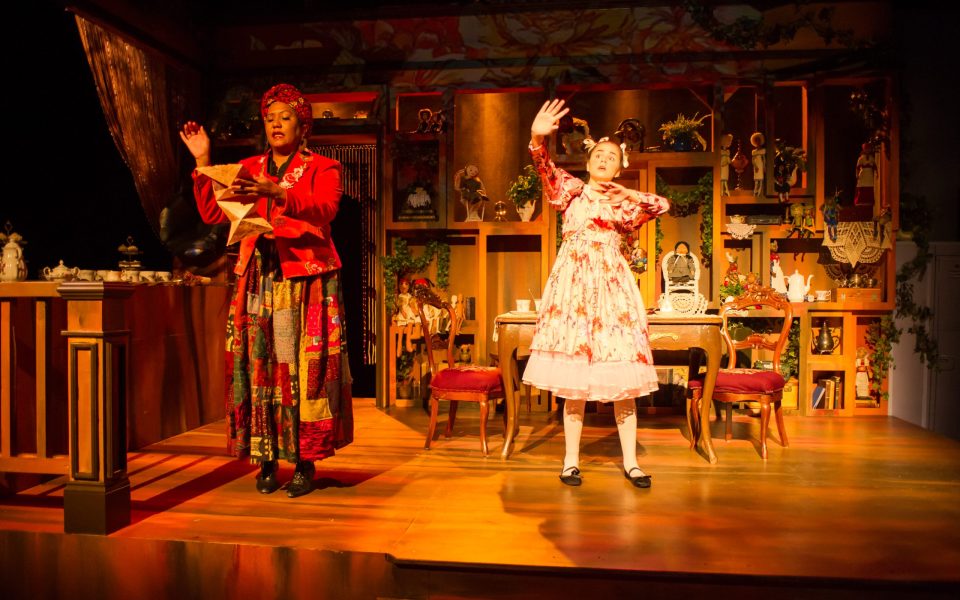“I don’t write poems. I am poetry,” explains Ms. M, wrapped in a patchwork of crimson and tangerine clothing, to Cadence, an Eastside girl in Winston-Salem’s Westside world.
Charli Hicks portrays Cadence, the young and spirited protagonist of Learn to Play Doll, a Peppercorn Theatre at Kaleideum play written by Angelica Chéri that’s showing at HanesBrands Theatre through July 15. The hour-long play follows Cadence, a young black girl who finds herself isolated and outcast when her family moves to the other side of town (“a whole different country”) after her mom lands a new job at Wake Forest University, and is inspired by the late Maya Angelou, who is connected to Winston-Salem through many decades of teaching at Wake Forest from 1982 to 2011. Nadiyah Quander portrays “Ms. M,” a nod to Angelou, whose every morning begins with tea in a magical room bursting to life with talking dolls.
As Cadence will come to learn, “Mornings begin with the mouth, what you drink, what you eat,” Ms. M says. “But most important of all is what you say…. One word can throw the bluest sky to the dogs… either bring the clouds or chase them away.”
Ms. M and her dolls would chase thunderous skies away throughout Cadence’s tumultuous transition when her beloved doll Bella isn’t enough.
“Mom let her rich new friends get in her head,” Cadence tells the audience. “They said my old school was low-performing — something stupid about test scores. Who cares? My whole heart and soul is at that school.”

©
She hangs tight to Bella, who suggests Cadence write a poem to work through her feelings.
“What once was up has now turned down/ what once was black is white/ what happened to this world I know?/ I guess it crept away one night/ and now’s the dawn of a new day/ the sun is burning bright/ it’s like I’m in a desert, parched and alone and there’s no shade in sight/ it’s like I’m in a Westside desert and there’s no shade in sight.”
It helped, until the first day at the Westside school. No one looks like her except Ava, a mixed-race “bougie black girl” played by Sarai Rasheed, the first peer Cadence meets in the halls. Though Ava joins mobs of white children in taunting Cadence for being a “hoodrat” and “baby” for carrying a doll, the tables turn when Cadence hits a nerve and learns that her own words can be violent, too.[pullquote]Learn more at downtown.kaleideum.org/peppercorn.[/pullquote]
“‘Humiliated’ is when you’ve been embarrassed so badly that it hurts,” Ms. M explains with a sullen face.
And Cadence did hurt.
“Words can be a disaster,” she laments.
But Ms. M suggests the greatest disaster of all is failing to stand up for yourself when others throw degrading language your way.
“Never let them take your voice,” Ms. M urges. “Use it to speak, to shout, rejoice! Words are a precious gift of life. They can be smooth like silk, or sharp like a knife. Words can save your soul, when everything fails, words can take control…. Reclaim your voice or pay the price.”
Like Angelou, who didn’t speak for years as a child in the aftermath of rape, Ms. M reveals to Cadence that she vowed never to allow anything, or anyone, come between her and her voice again. Also, like Angelou, Ms. M preaches the healing power of language, an overarching theme on the stage.
There are a few more charming allusions to Angelou’s life and works that make Learn to Speak Doll a unique experience for adults in the audience, including a reference to one of Angelou’s closest friends “Dolly.” In the play, Cadence discovers a line of connection to the local poet when Ms. M reveals her friend as Cadence’s grandmother, the one who gave her Bella before her passing. In real life, Dolly McPherson taught at Wake Forest before and alongside Angelou for decades. (In 1974, McPherson became the first full-time African-American woman faculty member.) It’s a hometown play, after all, but its appeal is universal.
Dialogue may spell out motifs with blunt force, but there’s nothing wrong with that here — Learn to Speak Doll is a play for children and it’s sweet like the sugar in Ms. M’s healing teas. Her words, Angelou’s words, are for everyone, but especially girls like Cadence who are finding their voices in a culture than demeans and dismisses them, learning that what they have to say matters and harnessing the courage to speak.
Join the First Amendment Society, a membership that goes directly to funding TCB‘s newsroom.
We believe that reporting can save the world.
The TCB First Amendment Society recognizes the vital role of a free, unfettered press with a bundling of local experiences designed to build community, and unique engagements with our newsroom that will help you understand, and shape, local journalism’s critical role in uplifting the people in our cities.
All revenue goes directly into the newsroom as reporters’ salaries and freelance commissions.


Leave a Reply